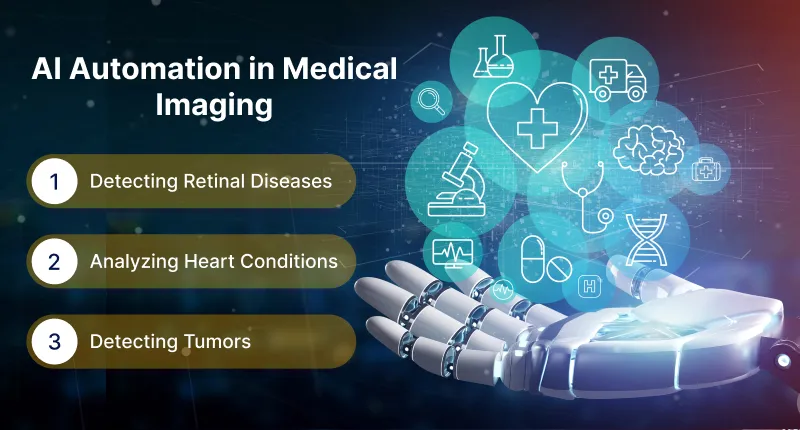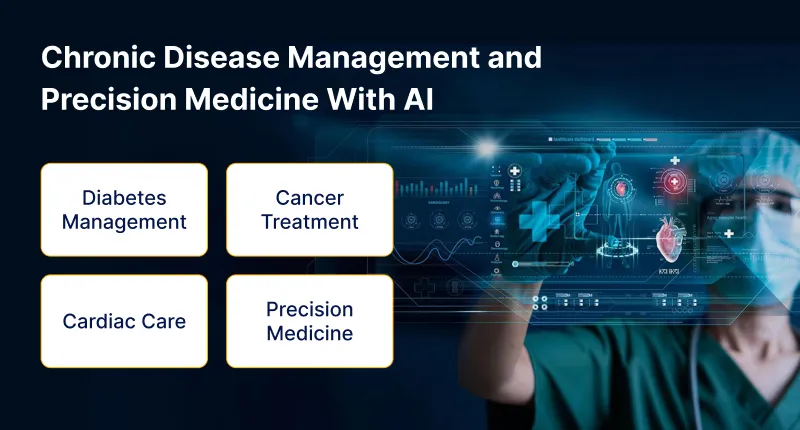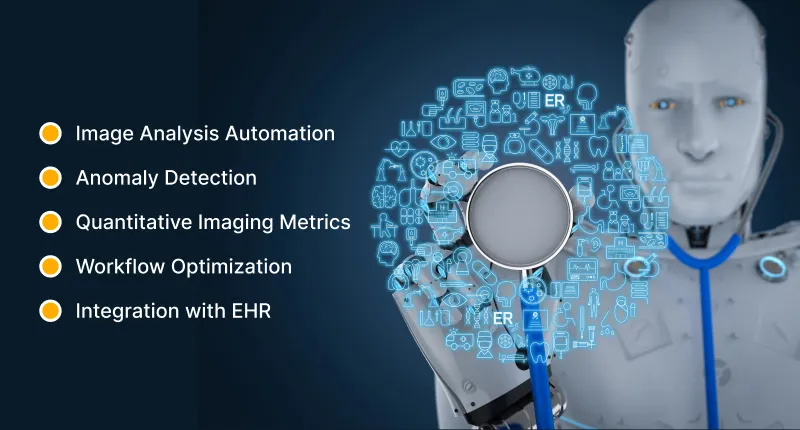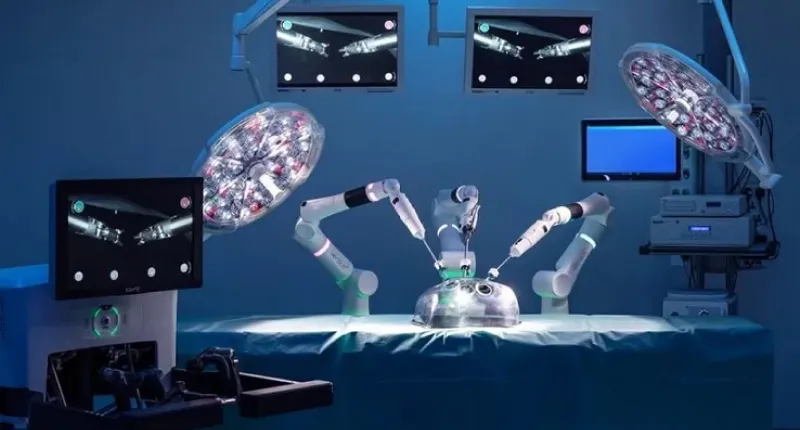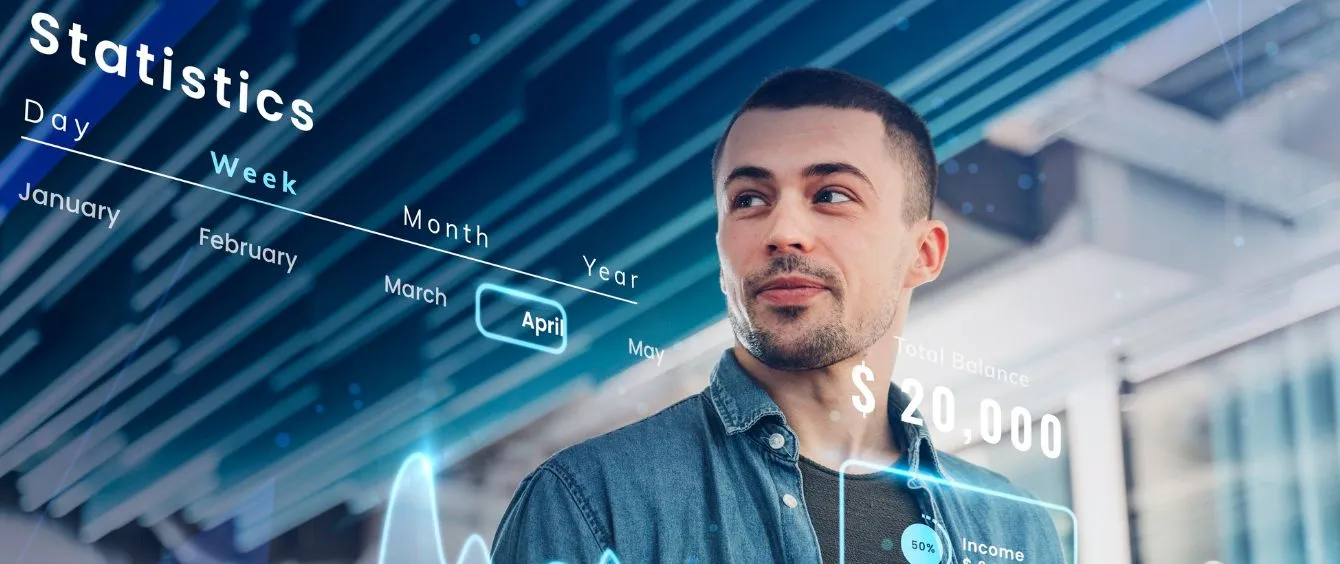As the demand for healthcare services rises, automation plays a crucial role in ensuring scalable, accessible, and high-quality care. It is paving the way for a healthcare system that is more responsive, resilient, and patient-centered than ever before.
From managing patient records to facilitating diagnostics, AI automation in healthcare is fuelling advancements that promise to redefine patient care, operational efficiency, and overall medical innovation.
Let’s check out this blog post to explore how AI automation is shaping the future of healthcare by addressing key challenges and unlocking new possibilities for improved medical services.
How AI Automation is Reshaping the Healthcare Industry
Integrating AI automation in healthcare enhances efficiency and allows healthcare providers to focus on delivering better patient outcomes. Here is how AI automation in healthcare is affecting this industry:
1. AI-Powered Diagnostics & Imaging
AI algorithms analyze vast amounts of medical data, including images and scans, more precisely than traditional methods. They can detect subtle patterns that human eyes might miss, leading to more accurate diagnoses.
AI-powered systems can process imaging data much faster than manual analysis. This significantly reduces the time it takes for healthcare professionals to diagnose conditions, improving patient outcomes by enabling quicker treatment decisions.
Key Advantages
1. Faster Processing Times: AI can process imaging data much faster than manual analysis, reducing the time it takes for healthcare professionals to diagnose conditions.
2. Support for Clinicians: Provides decision support to doctors, helping them make more informed choices about patient care.
3. Invasive options for Treatment: Early detection of diseases leads to better prognosis and less invasive treatment options.
4. Enhanced Diagnostic Accuracy: AI-powered systems improve the detection of diseases by identifying minute anomalies in medical images.
Applications
1. Tumor Detection: AI tools are used to identify malignant tumors in MRI and CT scans, often detecting cancers earlier than conventional methods.
2. Cardiac Imaging: AI algorithms analyze heart scans to detect signs of coronary artery disease or arrhythmias, offering precise insights that guide treatment.
3. Ophthalmology: AI-based diagnostic tools help identify retinal abnormalities that can lead to blindness, allowing for early intervention.
Our automation services help reduce admin burden so you can prioritize patient wellness.
2. Streamlining Administrative Tasks with AI Automation
AI technology automates time-consuming administrative duties such as appointment scheduling, billing, and patient data management. AI-driven tools streamline tasks like insurance claim processing, ensuring quicker reimbursements and fewer errors.
Natural Language Processing helps automate the transcription of doctor-patient interactions, converting voice notes into structured data for medical records. By taking over routine, repetitive tasks, AI frees healthcare staff from mundane responsibilities and focuses on delivering patient care.
Key Benefits
1. Efficiency Improvement: Automates repetitive tasks, freeing up staff to focus on patient care.
2. Error Reduction: Minimizes human errors in billing and data entry.
3. Cost Savings: Reduces operational costs associated with administrative work.
Read More : – IoT in Healthcare: Benefits, Challenges and Applications
Notable Use Cases
Hospitals are increasingly adopting AI-driven administrative systems to enhance operational efficiency and patient care, as evidenced by successful case studies.
1. Automated Scheduling Systems: A hospital in New York implemented an AI-based scheduling system that automatically assigns patients to time slots based on availability, medical urgency, and staff schedules
2. AI-Driven Billing: A major healthcare facility in London adopted AI-driven billing and coding systems, reducing manual errors in insurance claims by 40%. This also resulted in faster processing times and improved patient satisfaction.
3. Real-Time Data Management: In a large U.S. healthcare network, AI tools manage and update patient records in real-time, reducing the administrative burden on staff by 25% and enhancing data accuracy.
3. AI-Driven Personalized Treatment Plans
AI algorithms analyze large datasets from patient records, including genetic information, lifestyle habits, and medical history, to create personalized treatment plans. ML identifies patterns in patient data to recommend treatments that are most likely effective for an individual.
AI/ML services in healthcare enable healthcare providers to move away from one-size-fits-all treatments and focus on precision medicine, offering automated healthcare solutions for patients.
Benefits
1. Health Tracking: AI models track patient health data over time, predicting how diseases like diabetes, cancer, or heart conditions may progress in an individual case.
2. Predictive Analysis: These predictive capabilities also assist in identifying patients who are at high risk for certain diseases, enabling early interventions and personalized preventive care.
3. Early Intervention: AI helps doctors identify high-risk patients for certain diseases, enabling preventive care measures.
Examples in Chronic Disease Management and Precision Medicine
1. Diabetes Management: AI-driven systems monitor blood sugar levels and dietary patterns, allowing real-time adjustments to insulin doses or meal plans to improve patient disease control.
2. Cancer Treatment: AI tools analyze genetic markers and tumor profiles to recommend specific chemotherapy regimens or targeted therapies, increasing treatment effectiveness.
3. Cardiac Care: In patients with heart disease, AI predicts the likelihood of future heart attacks by analyzing data from wearables and medical records, guiding doctors to prescribe personalized medications and lifestyle changes.
4. Precision Medicine: AI helps tailor treatments for conditions like rare genetic disorders by analyzing individual patient genomes, offering particular drug therapies optimized for their genetic makeup.
We help you free up resources by automating repetitive tasks in healthcare management.
4. AI in Drug Discovery and Research
Automation significantly speeds up drug discovery by analyzing datasets to identify potential drug candidates faster than traditional methods. Machine learning predicts interactions with biological targets, shortening the timeline to clinical trials.
Benefits
1. Time Efficiency: Speeds up initial phases of drug discovery, shortening the timeline from discovery to clinical trials.
2. Cost Reduction: Minimizes costly failures during clinical trials by focusing on candidates with higher success probabilities.
3. Innovation Enhancement: Optimizes drug design by suggesting modifications based on existing research and chemical properties.
Recent Breakthroughs
1. Alzheimer’s Disease Research: AI has helped identify new drug candidates for neurodegenerative diseases where traditional methods have been less successful.
2. COVID-19 Therapeutics: AI analyzed existing drugs to discover medications that could be repurposed to treat COVID-19, expediting therapeutic options.
3. Predictive Success Models: AI platforms predict the success of drug candidates in clinical trials, increasing overall success rates.
Read More : – Cloud Computing: How Will It Shape the Future of the Healthcare Industry?
5. Enhancing Telemedicine with AI Automation
AI automation in healthcare is increasingly becoming a vital telemedicine component, facilitating virtual consultations between patients and healthcare providers.
Through advanced algorithms, AI can assist in triaging patients before they speak with a physician, ensuring that the most critical cases receive immediate attention.
The integration of AI helps streamline the appointment process, workflow optimization, integration with EHR, anomaly detection, etc. This improves the overall patient experience and ensures timely access to healthcare services.
AI Tools
1. Symptom Checker: AI-powered symptom checkers allow patients to input their symptoms and receive preliminary assessments, guiding them on whether they should seek further medical attention.
2. Wearable Devices: Continuous patient monitoring through wearable devices and health apps enables AI to analyze data in real time, alerting healthcare providers to any concerning changes in a patient’s condition.
3. Continuous Monitoring Tool: AI helps in automating healthcare processes and follow-up care by sending reminders for medication, appointments, and health tips, enhancing adherence to treatment plans, and improving patient outcomes.
Future Developments
1. AI Chatbots: Provide 24/7 access to basic healthcare information and support, handle routine inquiries, and assist in appointment scheduling.
2. Improved Accessibility: Makes remote consultations more effective, especially in underserved or remote areas.
3. Sophisticated Interactions: As natural language processing improves, AI chatbots will offer more human-like interactions, enhancing patient engagement.
We help decrease errors with reliable automation for precise medical records management.
6. AI for Remote Patient Monitoring and Preventive Care
Wearable devices, such as smartwatches and fitness trackers, equipped with AI technology can continuously monitor vital signs, activity levels, and sleep patterns.
These devices collect data that is analyzed in real-time, providing both patients and healthcare providers with immediate insights into health status.
By enabling remote health tracking, AI allows for proactive management of health issues, encouraging individuals to take charge of their well-being.
Advantages
1. Identify Health Risks: The healthcare industry automation utilizes predictive analytics to analyze trends in the data collected from wearable devices, identifying potential health risks before they escalate into serious problems.
2. Proactive Health Management: AI algorithms detect irregular heart rates or fluctuations in glucose levels, alerting patients and doctors to take timely action.
3. Early Risk Detection: This early intervention capability is especially crucial for patients with chronic conditions, as it can prevent complications and hospitalizations.
Impact on Chronic Disease Management
1. Improved Quality of Life: AI-driven remote monitoring can significantly improve the quality of life and health outcomes for individuals with chronic illnesses like diabetes and heart disease.
2. Personalized Care: Regular monitoring enables personalized treatment plans that adapt to patients’ conditions, ensuring they receive the most effective care.
3. Reduced Hospital Visits: Patients benefit from reduced hospital visits, as they can manage their conditions more effectively at home while staying connected to their healthcare providers.
Read More : – A Complete Guide For Healthcare App Development
7. Robotics and AI in Healthcare
AI technology is increasingly integrated into surgical procedures, enhancing patient precision and outcomes. Robotics provides surgeons with advanced tools with greater control and accuracy during operations.
These healthcare automation technologies work in tandem to assist surgeons in making real-time decisions, leading to improved procedural efficiency and patient safety.
Benefits of AI and Robotics in Surgery
1. Minimally Invasive Procedures: This leads to smaller incisions, less pain, and faster recovery times.
2. Enhanced Precision: Provides surgeons with greater control and accuracy.
3. Reduced Complications: Minimizes the risk of human error during complex operations.
Case Studies
1. Robotic-Assisted Prostate Surgery: Improved precision reduces side effects and speeds up recovery.
2. Cardiac Surgery Innovations: AI-assisted robots perform intricate valve repairs with high success rates.
3. Laparoscopic Procedures: Integration of AI has decreased hospital stays and postoperative complications.
We let automation enhance patient flow and experience in your facility.
Ethical and Regulatory Challenges in AI Automation
AI healthcare applications involve collecting and analyzing vast amounts of patient data, raising significant privacy issues. Implementing robust data protection measures ensures that personal health information remains confidential and secure.
Healthcare providers must obtain informed consent from patients before collecting and utilizing their data, fostering trust in AI applications.
Regulatory Challenges in Integrating AI into the Healthcare Industry
- The rapid advancement of AI technologies poses challenges for regulators, who must establish guidelines that keep pace with innovation.
- Current regulations may not fully address the complexities of AI algorithms, leading to gaps in accountability and oversight.
- Regulatory bodies must work closely with AI developers to create frameworks for ensuring AI-driven healthcare solutions’ safety, efficacy, and compliance.
The Need for Ethical AI Practices and Transparent Algorithms
- Ethical considerations in AI include fairness, accountability, and transparency, essential to maintaining patient trust and safety.
- Developers must prioritize creating algorithms free from bias, ensuring equitable treatment across diverse patient populations.
- Transparency in how AI systems make decisions is vital, as it allows healthcare professionals to understand and justify the recommendations provided by these technologies.
Promoting a Collaborative Approach to AI Implementation
- Engaging stakeholders, including healthcare professionals, patients, and ethicists, in the AI development process helps address ethical concerns proactively.
- Continuous education and training for healthcare providers on the ethical use of AI can enhance their understanding and application of these technologies.
- Regular audits and assessments of AI systems can help ensure compliance with ethical standards and regulatory requirements, promoting ongoing accountability.
Also read: Future Of Wellness Industry Market in 2024 And Beyond!
Future Prospects of AI and Automation in Healthcare
The healthcare landscape is set to undergo significant transformation as AI technologies evolve. Integrating AI with technologies like blockchain and IoT will further enhance data sharing and patient care.
The future impact of automation on the healthcare industry is described below:
- Advanced algorithms will enable earlier diagnosis and more effective treatment plans, improving recovery rates and overall patient satisfaction.
- AI-powered tools will also support healthcare providers by providing decision-making insights, leading to better clinical outcomes.
- Telehealth and AI-driven virtual care solutions will bridge the gap for underserved populations, ensuring broader access to quality healthcare.
- AI chatbots and virtual assistants will facilitate patient interactions, providing immediate support and reducing the need for in-person visits.
- Predictive analytics will help healthcare systems identify at-risk populations, enabling proactive outreach and preventive care measures.
We help streamline billing and claims with advanced automation for quicker reimbursements.
Conclusion
AI automation in medical services is revolutionizing healthcare by enhancing efficiency, accuracy, and innovation across the industry. From AI-powered diagnostics and treatment planning to advanced patient management tools, healthcare providers are embracing solutions that enable personalized care and streamline operations.
As technology evolves, the potential of AI to transform healthcare automation is limitless. Partner with ValueCoders to drive better patient outcomes, reduce costs, and build a sustainable, future-ready healthcare system.


